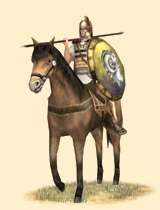Mistophoros Strategos (Hellenistic Mercenary General)
 |
Weapons | Defence | Mental | ||||||
|---|---|---|---|---|---|---|---|---|---|
| Primary | Secondary | Armour: | 10 | Morale: | 16 | ||||
| Type: | spear | sword | Shield: | 4 | Discipline: | disciplined | |||
| Attack: | 5 | 11 | Skill: | 11 | Training: | highly_trained | |||
| Charge: | 32 | 15 | Recruitment | Other | |||||
| Lethality: | 0.38 | 0.11 | Soldiers: | 25 | Hit Points: | 1 | |||
| Range: | 0 | 0 | Cost: | 4071 | Mass: | 1 | |||
| Ammo: | 0 | 0 | Upkeep: | 1018 | |||||
| Turns: | 1 | ||||||||

This mercenary general rides to war alongside handpicked soldiers similarly equipped as the Lonchophoroi cavalry of the Successors.
Elite
Disciplined
Hardy
Not every general or strategos in the Hellenic armies were of the royal family, be that by blood, marriage or adoption. There were many noblemen who either through skill or court influence could get command of an army. Sometimes though he's a Mistophoros Strategos, or mercenary selling his military knowledge to whomever can pay the high salaries he demands. And any mercenary general is like any craftsman. If he does his deals in a satisfactory manner, more will want his services and he can raise his fee as his reputation justifies it. The increased importance and prestige of cavalry in warfare after Megas Alexandros, means that most generals fight from horseback so not to diminish their personal honour and prestige. The general himself rides to war alongside handpicked soldiers similarly equipped as the Lonchophoroi cavalry of the Successors.
Historically, mercenary generals were often used by Hellenic rulers even before Alexander. Iphikrates, Xanthippus and Xenophon are among the most known Hellenic mercenary generals, but there are many mentions of others such as Memnon who fought for Darius III and Skopas who was in command of the Ptolemaic forces of Koile-Syria. The Ptolemaioi began to heavily rely on mercenaries and in turn mercenary generals from 200 BC onwards and there are numerous mentions of them in papyri and other sources. Pontos also hired mercenary generals and it seems they preferred Hellenic ones and they even gave them command of important armies. Other Hellenic states also hired generals, but seemed to prefer men connected to the royal family in some way. In some cases talented nobles outside the royal family could also be given the office of strategos and command of an army.